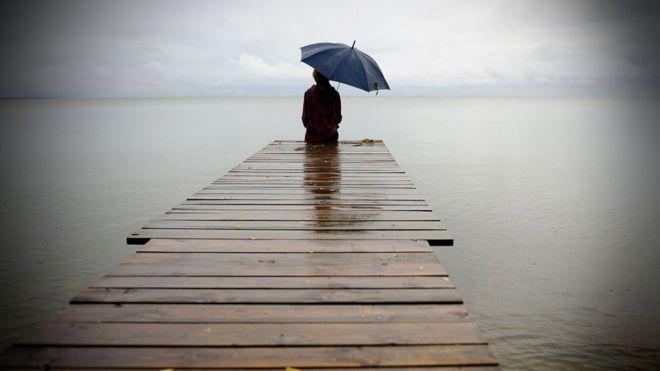
How being alone may be the key to rest
BBC Radio 4 | 27 September 2016
Last November an online survey
called The Rest Test was launched to investigate what rest means to different
people, how they like to rest and whether there is a link between rest and
well-being. The results are now in and the analysis has begun.
Rest sounds easy to define, but
turns out to be far from straightforward. Does it refer to a rested mind or a
rested body? Actually, it depends. For some, the mind can't rest unless the
body is at rest. For others it is the opposite. It is the tiring out of the
body through vigorous exercise that allows the mind to rest - 16% of people said
they find exercise restful.
Altogether,
18,000 people from 134 countries made time to take part in what was quite a
lengthy survey devised by Hubbub - an international group of academics,
artists, poets, and mental health experts - showing perhaps what a pressing
issue rest is in the modern world.
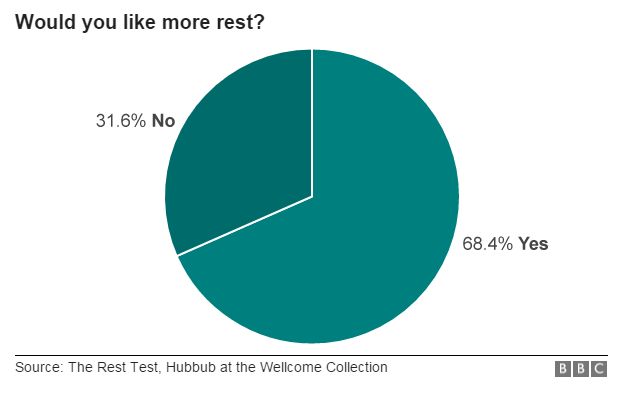
Just over two-thirds of
respondents said they would like more rest. Almost a third thought they needed
more rest than the average person, while 10% thought they needed less than
average.
One question asked people how
much they had rested the previous day, leaving them free to define rest in any
way they wanted to. The average was three hours and six minutes.
Another gave people a long list
of activities, asking them to rank the three most restful - and the results
were unexpected.
Reading came out as the clear
winner, followed by being in the natural environment, being on your own,
listening to music and doing nothing in particular.
What is striking is that all
these are activities often done alone.
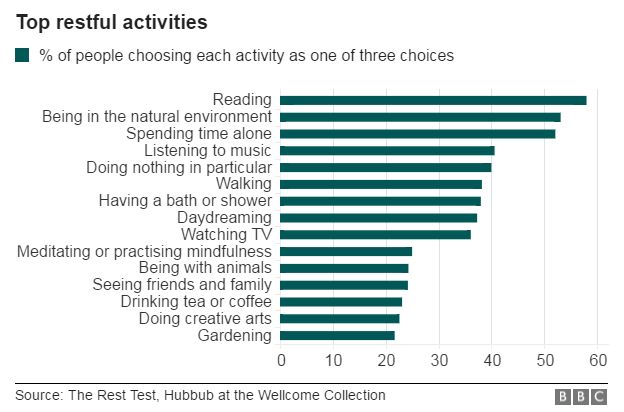
Seeing friends and family,
chatting or drinking socially all come much lower down the list. This doesn't
mean that the respondents don't like socialising, but that they don't consider
it to be particularly restful.
Interestingly, this applies
both in the case of extroverts - sometimes defined as people who gain energy
from being around others - and introverts, who find other people draining.
Extroverts do place chatting and socialising a little higher up the chart, but
still they are beaten by solitary activities.
We need to remember, of course,
that choosing to be alone is very different from enforced loneliness.

- The Rest Test is a collaboration
between BBC Radio 4 and the Wellcome Collection's researchers in
residence, Hubbub
- Hubbub is an international
collective led by Durham University, comprising scientists, artists,
poets, humanities researchers, mental health experts and social scientists
- among them the BBC's Claudia Hammond, presenter of All in the Mind
- Some 18,000 people from 134
countries took the survey - they were self-selecting, not randomly chosen
- The biggest survey of rest before
this was a fraction of the size, based on data from little more than 1,000
people.
The reason people
want to be alone might be explained by the answers people gave when they were
asked what is going on in their minds while they do different activities.
"People
said that when they were on their own mostly they were focused on how they were
feeling, so on their body or their emotions," says Ben Alderson-Day, a
psychologist from the University of Durham, who co-wrote the survey.
The idea that when people are
alone they are mentally talking to themselves is only partly true, it seems.
"People said they were only
talking to themselves in their head 30% of the time," says Alderson-Day.
"There is a hint that when
you're on your own, as well as switching off from other people, you get the
chance to switch off from your own inner monologue as well."
But just because we're on our
own doing nothing, that doesn't mean the brain is resting. Neuroscientists used
to think that the brain was less active whenever we stopped concentrating on a
task, but late in the 20th Century studies using brain scanners threw up some
curious findings and they realised they had got it wrong.
When we are at rest, supposedly
doing nothing, our minds have a tendency to wander and our
brains are in fact busier when we're not concentrating on a task, than when
we are.
These days it's common to hear
the complaint that rest is hard to find. So what if we don't have enough time
to do these restful activities? Does it matter?
Possibly.
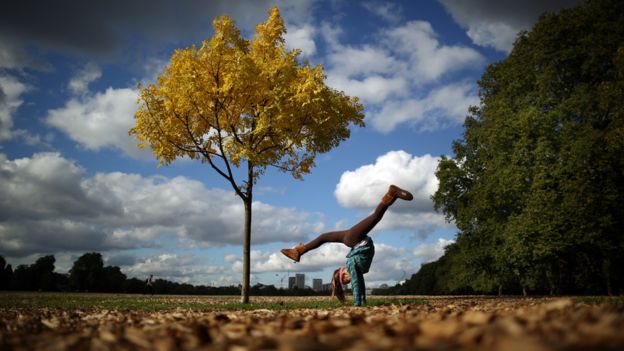
- You can hear more on the results
in The Anatomy of Rest on BBC Radio 4 - listen
online here
- The 10 most restful activities
- A free exhibition, Rest & its discontents, will be held at
Mile End Art Pavilion in London from 30 September to 30 October
- Hubbub's other work on rest, The
Restless Compendium, is free to download from 27 September
In the Rest Test
people who had fewer hours of rest the previous day score lower on a well-being
scale.
In fact people
who don't feel in need of more rest have well-being scores twice as high as
those who feel they need more rest. This suggests that the perception of rest
matters, as well as the reality. If we don't feel rested, our well-being is
lower.
People with the
highest well-being scores rested on average for between five and six hours the
previous day. If they had more rest than this, their scores began to dip
slightly. Might this suggest that enforced rest - if you are unemployed,
perhaps, or unwell - does not have the same impact on well-being? Perhaps five
to six hours is an optimum amount of time to rest.
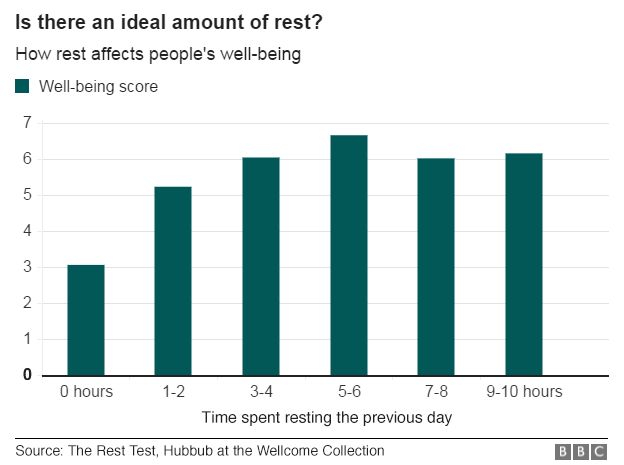
Of course, large as this survey
is, it gives us a snapshot in time. So we can't be certain that the rest or
lack of it had an impact on the well-being scores. Is it possible that,
instead, high well-being scores make us feel rested? The relationship between
rest and well-being is striking, though.
It was notable that when asked
which words they associated with rest, almost 9% of people chose
"guilty" or even "stress-inducing". Yes, rest seems to make
some people worry about the things they aren't doing.
Prof Felicity Callard of Durham
University, director of Hubbub, says: "We really need to challenge the
assumption that if you take more rest, you are more lazy. The fact that people
who are more rested seem to have better well-being is an endorsement for the
need for the rest."
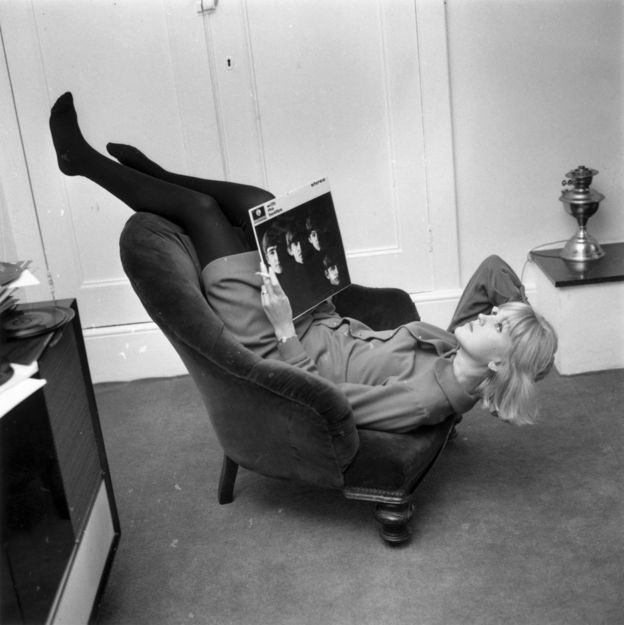 |
| Younger people are more likely to relax by listening to music |
So who gets the
most rest? Based on how many hours people told us they rested for in the
previous 24 hours, the least rested group were likely to be younger, working
traditional full-time hours or doing shift work that includes nights. They were
also more likely to have higher incomes or to be carers, while the most rested
group were more likely to be older, with lower incomes, unemployed, retired or
working split shifts - where people work for several hours, then have free time
and go back much later in the day or evening.
Men were more
likely to say they get less rest than the average person - but actually
reported getting 10 minutes more rest than women, on average, the day before
taking the survey.
What does rest look like to you?
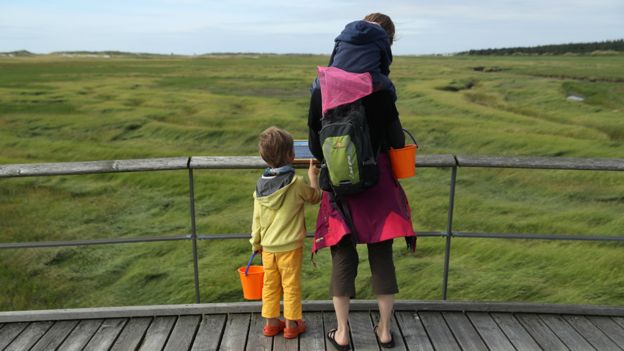
We'd like to see
your photographs of how you rest, from kicking back in an armchair to something
more energetic. What works for you?
Send your
pictures to yourpics@bbc.co.uk or upload them via this link
Please add the
word Rest in the subject line of your message.
Once again,
perceptions of rest could come into it. Busyness has become a badge of honour
in today's society. To be busy is to be wanted and valued. When someone asks us
how we are and we answer, "Busy, so busy," how much is our answer to
do with status? Are people with high incomes more likely to want to claim to be
busy? Or is it that they have jobs where new technology means that the boundaries
between work and rest become ever more blurred, leaving them with the feeling
that they can't fully switch off?
The answer to
another question might shed light on this. People were asked to what extent
they believe rest is the opposite of work. The majority of those employed
full-time answered that rest was the opposite of work, but people who were
self-employed or volunteering were less likely to think it was. Does control
over your work affect whether it can ever be seen as restful, even if you're lucky
enough to enjoy your work?
A full analysis
of the data will be published within the next year. It's already clear that it
holds lessons for doctors. Callard points out that when doctors prescribe rest,
not every patient will interpret the word in the same way.
"There's a
desire clinically to be more precise about what you are prescribing when you
prescribe rest. But you need to find out what that particular individual finds
restful. Simply telling some people to go and do nothing is likely to provoke
anxiety rather than restfulness."
Many people, it
seems, would like to have more time to rest but perhaps it's not the total
hours resting or working that we need to consider, but the rhythms of our work,
rest and time, with and without others.
To truly feel rest
do we need time alone without fear of interruption, when we can be alone with
our thoughts? From the Rest Test, it would appear so.
It's only recently that
sleeping and doing very little - the ways human beings have always rested -
have come to be seen as an insufficient response to life's difficulties.


No comments:
Post a Comment